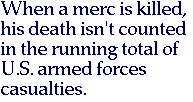
www.thornwalker.com/ditch/dtw_fallapart_1.htm
Wright from
Washington City
April 29,
2004
To part
two.
To part
three.
The Occupation
Things fall
apart
Part
one of three
By DAVID T. WRIGHT
| If you find this article of value, please send a donation of $2 to TLD. More information appears below. |
Editor's note. Mr. Wright completed parts one and two of this article just before the established media began to reveal the fuller scope of the Empire's torture and abuse of Iraqi "detainees." — Nicholas Strakon, editor-in-chief, May 6, 2004
First we were
told that Iraq must be invaded because
of the wicked Saddam's weapons of mass
destruction. Then, when it became painfully
obvious that there aren't any, the party line was
changed. Now the United State is in Iraq to
"liberate" the Iraqi people and bring "democracy"
to that benighted land — out of the goodness
of our rulers' hearts. However, that excuse is
beginning to wear out also, as the natives grow
both increasingly restless and more accomplished
at picking off U.S. soldiers.
Ungrateful little ragheads. Who do they think they are, behaving as if they have the right to manage their own affairs? But not to worry. George W. Bush has assured us that he is going to give them democracy on his own terms even if he has to kill every one of them to do it.
Now comes the interesting part. As U.S. casualties continue to rise, as they inevitably must, and as the violence accelerates, as it undoubtedly must, will the American public get cold feet, as they did regarding Lebanon and Somalia? There are signs that the Imperial authorities have considered that possibility and attempted to attenuate the bad public-relations effects of soldiers being killed in distant lands by angry natives.
The atrocities in Fallujah against four American "contractors," whose burned bodies were mutilated, dragged through the streets, and finally strung up on a bridge, highlighted an interesting phenomenon.
 Most "contractors" in Iraq are no doubt providing
logistical support and other such mundane
services to free up active-duty soldiers for
soldiering. But the ones killed in Fallujah worked
for Blackwater Associates, whose employees are,
according to published reports, commandos
— former Navy Seals (including the
company's CEO), Army Rangers, Delta Force
veterans, and the like. The newsreaders like to
call them "security contractors," bringing to mind
glorified rent-a-cops or bodyguards. But to put it
more precisely, they are members of an ancient
profession — closely related to the world's
oldest — that of the warrior who fights
for money: the mercenary.
Most "contractors" in Iraq are no doubt providing
logistical support and other such mundane
services to free up active-duty soldiers for
soldiering. But the ones killed in Fallujah worked
for Blackwater Associates, whose employees are,
according to published reports, commandos
— former Navy Seals (including the
company's CEO), Army Rangers, Delta Force
veterans, and the like. The newsreaders like to
call them "security contractors," bringing to mind
glorified rent-a-cops or bodyguards. But to put it
more precisely, they are members of an ancient
profession — closely related to the world's
oldest — that of the warrior who fights
for money: the mercenary.
The AP's Katherine Pfleger Shrader reports that about 20,000 "private security contractors" are employed in Iraq, working for "dozens of companies." And that's not all: "Thousands more are on assignments for the United States and others worldwide, including in Afghanistan, taking on jobs like guarding officials, protecting buildings and supply convoys, and training police and soldiers." ("Forces stretched thin, U.S. increasingly contracts private forces in Iraq," Associated Press. This version appeared in the Boston Globe, April 27, 2004.)
Ironic, that, considering the high-mindedness to which the U.S. occupation pretends. Employing mercenaries, who serve voluntarily, has traditionally been considered much less honorable than using conscripts, who can more properly be referred to as slaves. Mercenaries, narrowly defined as paid soldiers who do not belong to the armies of the nation-states for which they fight, have symbolized corruption and tyranny in America from the very beginning of the late, lamented Republic (as, originally, were standing armies in general).
A case in point is the German soldiers who assisted King George III's efforts to put down the colonials rebelling against a piddling tax on tea and other, mostly minor — by today's standards — outrages. While the so-called Hessians were labeled mercenaries by separatist rabble-rousers, they were, in fact, often conscripts. Their rulers, the petty despots of small states, kept the King's remuneration for themselves. Later, free-lance pros who fought for the Rhodesian government of Ian Smith helped give mercs a bad odor in the nostrils of progressives in Europe and America, adding to the outcry that led to its being replaced by the current enlightened and humane regime of Robert Mugabe.
But cheer up. Already there is talk about bringing back the draft, and some of it has been uttered by a Republican senator. The august Chuck Hagel of Nebraska has begun making noises about how today's young Americans should "bear some responsibility" and "pay some price" for the defense of our precious freedoms and all the usual balderdash. At the moment it seems to be merely a trial balloon. I assume Mr. Hagel was chosen to make this sally because he has a safe seat. Even so, the fact that he already hasn't been tarred, feathered, beaten within an inch of his life, and ridden out of Nebraska on a rail is a bad omen.
***
There's been much conjecture about the actual mission of the Blackwater soldiers of fortune. A great deal of it revolves around the question of whether they are employed to do dirty work unsuitable for the ordinary U.S. soldier or Marine: missions such as assassination, sabotage, kidnapping, etc. That makes sense because those are the kinds of mission for which they were trained in their original elite units. And the way the four mercs in Fallujah died may support that theory.
 The mercs may have been targeted for death. Some accounts say that they were lured into ambush by "informants." They were driving not military vehicles but ordinary SUVs
when they were caught in a hail of bullets and
rocket-propelled grenades by a small but
seemingly well-disciplined squad of resistance
fighters. The attackers didn't stick around: as
soon as it was clear that their targets were dead,
they split. The mutilations and other atrocities
carried out on their dead bodies were committed
by bystanders (!).
The mercs may have been targeted for death. Some accounts say that they were lured into ambush by "informants." They were driving not military vehicles but ordinary SUVs
when they were caught in a hail of bullets and
rocket-propelled grenades by a small but
seemingly well-disciplined squad of resistance
fighters. The attackers didn't stick around: as
soon as it was clear that their targets were dead,
they split. The mutilations and other atrocities
carried out on their dead bodies were committed
by bystanders (!).
But did the attack occur in a wider context? Here's a possibility that's rich with implication. When a mercenary is killed, his death isn't counted in the running total of U.S. armed forces casualties. Can it be that the mercs are used for the more dangerous missions to keep the official body count down, while members of the formal armed forces are kept back?
If so, it's a strategy that seems to have backfired with the Fallujah incident: now that the images of the bodies being desecrated and hung from a bridge have been broadcast, some of the lickspittle American media have finally found the courage to publish pictures of dead U.S. soldiers — although usually all that is visible are booted feet or (rarely) a shape in a body bag or a flag-draped coffin. Even those glimpses are accompanied by a lot of hand-wringing on the part of Minitrue spokesmen, who are apparently torn between the "people's right to know" — that is, opportunities to grab market share — and the requirements of "good taste" — that is, the requirement to be a good little propagandist.
***
That the bodies are starting to pile up faster can't be denied. What also can't be denied is the fact that the growing unrest results mostly from the ineptitude and arrogance of the U.S. occupiers.
That first became evident in reports from the foreign press in the autumn of 2003. One especially troubling report was by Patrick Cockburn, reporter for the left-wing British newspaper the Independent and brother of leftist columnist Alexander Cockburn:
U.S. soldiers driving bulldozers, with jazz blaring from loudspeakers, have uprooted ancient groves of date palms as well as orange and lemon trees in central Iraq as part of a new policy of collective punishment of farmers who do not give information about guerrillas attacking U.S. troops...."They made a sort of joke against us by playing jazz music while they were cutting down the trees," said one man. Ambushes of U.S. troops have taken place around Dhuluaya. But Sheikh Hussein Ali Saleh al-Jabouri, a member of a delegation that went to the nearby U.S. base to ask for compensation for the loss of the fruit trees, said American officers described what had happened as "a punishment of local people because 'you know who is in the resistance and do not tell us.' " ("U.S. soldiers bulldoze farmers' crops," posted at Iraq Occupation Watch, October 12th, 2003)
 That, of course, is a carbon copy of Israeli tactics
against the Palestinians: the Israeli "defense
forces" regularly bulldoze olive groves, houses,
and other private property on the West Bank. They
even play music while they're doing it.
That, of course, is a carbon copy of Israeli tactics
against the Palestinians: the Israeli "defense
forces" regularly bulldoze olive groves, houses,
and other private property on the West Bank. They
even play music while they're doing it.
The orchard destruction was not an isolated incident. A Reuters reporter, Andrew Hammond, reported in December 2003 from Hawija, Iraq:
When U.S. soldiers found explosives in the house of Aziz Abdel-Wahhab and his elderly wife during a raid in the Iraqi town of Hawija, they proposed swift and direct punishment — demolishing the building."This house is the heart of terrorism and if you're going to harbour terrorism we're going to remove you from the community," said 1st Lieutenant Steve Brignoli, explaining the order to destroy the one-story stone house in a Hawija suburb.
"This will be a show of force, to embolden the local authorities." ("U.S. army uses bulldoze threat to get Iraqis to talk," posted at Iraq Occupation Watch, " posted at Iraq Occupation Watch, October 12th, 2003)
In that case, the U.S. forces showed mercy: they didn't bulldoze the entire house, only part of it.
From the same report:
As troops headed off in search of Adel (the couple's son), public affairs officer Major Doug Vincent, whose job is to win hearts and minds, handed out fliers apologising for any inconvenience.
"These operations were carried out with local authorities to ensure your security and a more safe and free Iraq for all Iraqis in which to raise your children and practice your religion without fear," the leaflets said.
Undoubtedly that made everyone feel much better.
© 2004 WTM Enterprises. All rights reserved.
To part two.
If you found this article to be interesting, please donate to our cause. You should make your check or m.o. payable in U.S. dollars to WTM Enterprises and send it to:
WTM Enterprises
P.O. Box 224
Roanoke, IN 46783
Thanks for helping to assure a future for TLD!
Notice to visitors who came straight to this document from off site: You are deep in The Last Ditch. You should check out our home page and table of contents.